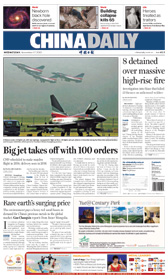Multi-party general election begins in Myanmar
Updated: 2010-11-07 09
(Xinhua)
|
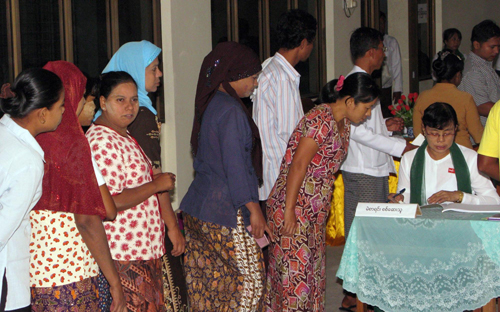 Residents line up to cast their vote at the polling station in central Yangon as Myanmar holds its elections November 7, 2010. [Photo/Agencies]
|
NAY PYI TAW - A multi-party general election began across Myanmar Sunday morning under the 5th step of the country's seven-step roadmap with people starting to go to polls and cast votes at respective polling booths.
Residents in Myanmar's new capital of Nay Pyi Taw started to go to polls on Sunday morning at 6 am (2330 GMT Saturday), the official start of the voting, with a large number of local people casting votes as part of the country's multi-party general election that began on the day.
Before the starting hours, voters have been crowded in front of a kindergarten in Zabuthiri township where the constituency No. 1 was set up for the polling.
The parliamentary election, which represents the first in two decades, is underway nationwide on secret polling system, observed regionwise by over a dozen groups of foreign diplomats and United Nations officials based in Myanmar.
Local and foreign newsmen stationed in Myanmar are also arranged to take news in different parts of the country.
A total of 37 political parties, approved by the Union Election Commission as being qualified for the election entry, took part in the polls held across the country's seven regions and seven ethnic states for over 1,000 parliamentary seats.
A total of over 3,000 parliamentary candidates including 82 independent ones are contesting for about 1,160 parliamentary seats, of which 326 are reserved for the House of representatives, 168 for the house of Nationalities and 665 for region or state parliament.
The house of representatives and the house of nationalities make up the Union Parliament.
Representing the Union Solidarity and Development Party (USDP) as a candidate , Prime Minister U Thein Sein contests against U Kyaw Aye, candidate of the National Unity Party (NUP), for the seat of house of representatives.
USDP's U Khin Maung Htay contest against U Myint Oo of NUP and U Aung Zaw Oo of Union of Myanmar Federation of National Politics for the seat of house of nationalities.
In Nay Pyi Taw's eight townships, four parties and two independents with a total of 25 candidates contest. The USDA candidates to compete for the parliamentary house of representatives include four state leaders -- SPDC member Thura U Shwe Mann, Prime Minister U Thein Sein and SPDC First Secretary Thiha Thura U Tin Aung Myint Oo.
The other three parties are National Unity Party (NUP), National Political Alliance League (NPAL) and Union of Myanmar Federation of National Politics.
There are 1,159 constituencies established townshipwise for the parliamentary election, of which 54 require no polling as these townships each register only one candidate with no opponent in contest. Of the 54 candidates, the Union Solidarity and Development Party shares 52.
With 29 million qualified voters out of nearly 60 million's population in the whole country, Yangon region accounts for 4.4 million, while Mandalay 4.399 million.
The country has a total of 40,000 polling booths, of which 6, 000 are in Yangon region, while 5,800 in Mandalay.
According to the new state constitution adopted in 2008, election will be made on union parliament and region or state parliament.
As a follow-up, the union parliament will elect president and vice presidents and then form a new government.
For the whole country, the Union Solidarity and Development Party (USDP), led by Prime Minister U Thein Sein and involving 26 other senior government officials, has fielded 1,112 candidates to contest for about 1,160 parliamentary seats.
The USDP, claimed as having a membership of 16 to 18 million, became a political party transformed from the government-backed biggest social organization -- the Union Solidarity and Development Association (USDA) established in 1993.
Quitting their military titles and representing the USDP to contest for the parliamentary house of representatives election, No 3 state leader Thura U Shwe Mann, who is member of the State Peace and Development Council (SPDC) and Chief of General Staff of the Army, Navy and Air Force, contests in Nay Pyi Taw's No 8 constituency -- Zeyathiri township, No 4 leader Prime Minister U Thein Sein in Zabuthiri township, No 5 leader SPDC First Secretary Thiha Thura U Tin Aung Myint Oo in Popathiri township as well as USDA Secretary-General and Minister of Agriculture and Irrigation U Htay Oo in Ayeyawaddy region's Hindata township.
In eight townships of Nay Pyi Taw district, the USDA mainly challenges with the National Unity Party (NUP).
Contesting in Yangon region for house of representatives election, the 149 USDP candidates mainly include Minister of National Planning and Economic Development U Soe Tha in Twantay township, Energy Minister U Lun Thi in Kungyangon township, Yangon Mayor U Aung Thein Lin in South Okkalapa township.
In addition to the USDP, the main challenging parties in terms of the most number of candidates go to the U Tun Yi-led National Unity Party (NUP), reorganized from the previous government's disbanded ruling Myanmar Socialist Program Party, and the U Than Nyein-led National Democratic Force (NDF), a break-away party from the disbanded National League for Democracy (NLD).
The others go to Shan Nationalities Democratic Party, Union of Myanmar Federation of National Politics, Rakhine Nationalities Development Party, Democratic Party (Myanmar).
Regionally speaking, 15 parties and 26 independent delegates contest in Yangon region, while 10 parties and 6 independent delegates in Mandalay region
According to the new constitution, the military possesses non- elected parliamentary seats, which is 25 percent in each of the parliaments -- union parliament and region or state parliament. The military-represented parliamentary seats are nominated by the commander-in chief of the defense services.
The polling booths will close on the day at 4 pm local times (0930 GMT), which will be followed by open counting of votes in the presence of the public.
Under the new state constitution, the present general election is being held as the fifth step of the seven-step roadmap.
According to the new constitution, the name of Myanmar is the Republic of Union of Myanmar. It designates that Nay Pyi Taw is the country's capital and stands as a union region directly under President's administration and the country's inalienable administrative regions are demarcated as seven regions (previously known as divisions) and seven states of national races as well as five self-administered zones of ethnic minorities and one self- administered division of another minority.
The country is to adopt an executive system of President as head of state who is produced through the union parliamentary election. The president is also chief of national defense and security commission in which commander-in-chief of the defense services is a member.
Politically, it pursues a multi-party democratic system with the military participating in the leading role in the country's national politics. The military holds 25 percent of parliament representatives in different-level in which military representatives are non-elected but nominated by the armed forces' commander-in-chief.
Economically, it adopts a market-oriented economic system, allowing the private sector to participate in the economic undertakings of state, regional, cooperative and joint venture organizations for national economic development.
In foreign relations, Myanmar practices an independent, active and non-aligned foreign policy and maintain friendly relations with foreign nations, upholding the principles of peaceful coexistence among nations. It does not allow foreign troops to be deployed in the country.
The constitution shall come into operation throughout the union from the day the first session of the union parliament is convened, the constitution states in transitory provisions.
Meanwhile, using another provision of the constitution which empowers the State Peace and Development Council, the council started to introduce new state flag on October 21 prescribed in the new constitution, while retaining the old national anthem.
Paper's Digest

China bags Asiad team tennis title after 24 yrs
Wimbledon semifinalist Li Na led host China to capture the team tennis title on Tuesday at the Asian Games, accomplishing her Asiad tour with three consecutive victories.
China rate rises no panacea to curb inflation: PBOC adviser
Specials
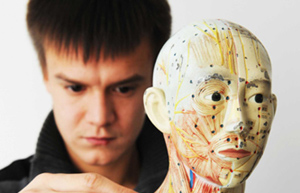
Russian possessed with TCM
Born into a family of doctors, Maxime became interested in Traditional Chinese Medicine (TCM) at the age of 12, after hearing about TCM theories such as health preservation and recuperation.
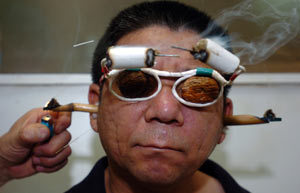
Acupuncture takes stab at UNESCO list
Acupuncture and Peking Opera have been selected as candidates for UNESCO intangible cultural heritage status.
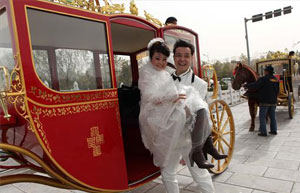
The wedding coach comes back to life
A groom carries his bride from a wedding coach in Xuchang, Henan province, Nov 11, 2010. Produced a local factory, various original hand-made wedding carriages were displayed on the streets, attracting young people chasing fashion and an environment-friendly lifestyle.
